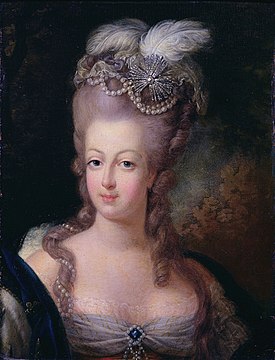 Marie Antoinette (1755-1793)
Marie Antoinette (1755-1793)I kicked off this blog with a post titled "Just the Facts, Ma'am" about my experience researching and writing ROYAL AFFAIRS. I joked that because I came to nonfiction as a multipublished novelist, it was a challenge not to be able to make things up.
One thing I can assure my readers is that, apart from the way I structured ROYAL AFFAIRS, nothing in the survey of these scandalous liaisons "that rocked the British monarchy" for more than nine centuries, came from my oh-so-fertile imagination. I read numerous historical biographies and articles by respected historians and academics. And, while I tried at all costs to avoid doing so, it's certainly possible that I may have inadvertently included what I like to call "bad history" here and there.
"Bad history" (I did make up the phrase) is how I term stories that have been handed down through the ages, repeated from biographer to biographer over the centuries as though they are factual. However, oftentimes a biographer will refer to a shopworn legend, such as Marie Antoinette saying "Let them eat cake" (Qu'ils mangent de la brioche) and then immediately disclaim it, pointing out who really said it and in what context.
On other occasions I've seen biographers discuss an event or anecdotal bit of information about an historical personage, followed by the statement that its accuracy has never sufficiently been proven, or is in doubt. Whether Eleanor of Aquitaine rode to the Crusades barebreasted (or not) like an Amazon warrior queen, is a fine example. It turns out it's partly true (no, not the barebreasted part), based on an eyewitness account of Eleanor astride her horse, and quickly became elaborated by those seeking to discredit a queen who they wished to paint as a brazen, adulterous slut.
 Eleanor of Aquitaine (1122-1204)
Eleanor of Aquitaine (1122-1204)Those are important distinctions; and when I've discovered during my research that something we all have been taught as schoolchildren probably never happened I make the decision for my own nonfiction--to omit any reference to the event, or to bring it up and include the disclaimer.
For example, for centuries it was popularly believed that King Edward II of England, a notorious "sodomite," was killed by the insertion of a hot poker into his anus, during his imprisonment. Or smothered by a table so he couldn't wriggle about, followed by the hot poker. Various versions of this gruesome death were recorded and repeated throughout the ages, from Sir Thomas More to the 20th century academic, A.L. Rowse. In the ROYAL AFFAIRS entry on Edward, I refer to the legendary story of the king's death as well as all doubts, discrepancies, and disclaimers regarding its veracity.
 Edward II of England (1284-1327[?])
Edward II of England (1284-1327[?])So I can promise my readers that I didn't invent anything I refer to in ROYAL AFFAIRS. All of the information I include was gleaned from the dozens of sources I read in the course of my research. If an historical biographer didn't refer to (or know) whether an event was in fact merely apocryphal, or fictional (or introduced a refutation of it), it was not possible for me to know otherwise.
Now I am neck-deep in research for a companion book to ROYAL AFFAIRS. The working title is WHAT'S LOVE GOT TO DO WITH IT? Notorious Royal Marriages from Eleanor of Aquitaine to Camilla Parker Bowles. I face the same challenges, sifting through centuries of history, scanning for the personal opinions and political agendas of the monks, lovers, bosom companions, staffers, journalists, politicians, academics, and historians -- and sometimes the royals themselves -- who have written or spoken about the sovereigns I plan to include in Notorious Royal Marriages. With one hand raised and the other firmly placed on an encyclopedia (not Wikipedia), I can assure my readers that to the best knowledge that extensive research can yield, the book will contain ... Just the Facts, Ma'am.








.jpg)


2 comments:
Mrs. Carroll - I just finished Royal Affairs this afternoon and I was so delighted and entertained during the entire read. How fascinating! I esp. loved the genealogies that were pointed out from these unions that at first just seen a typical affair- but look at the offspring! Absolutely loved the book and I'm excited to hear you are writing a follow up.
I've highly recommended the book to friends and family. Wonderful job! Just love reading your research. Many times after finishing a chapter, I found myself rushing to Google the pair to see if a photo or painting was available. It was great to put a face with your stories.
Thank you for a wonderful read!
Thanks so much Rachael! As I researched ROYAL AFFAIRS, I, too, became amazed by the genealogy and the "A-list" descendants of some of the affairs. The whole writing process was one of discovery. Who knew that so much of the direction of English history and religion can be traced to the results of, or reasons for, those stolen nights of passion?!
Post a Comment